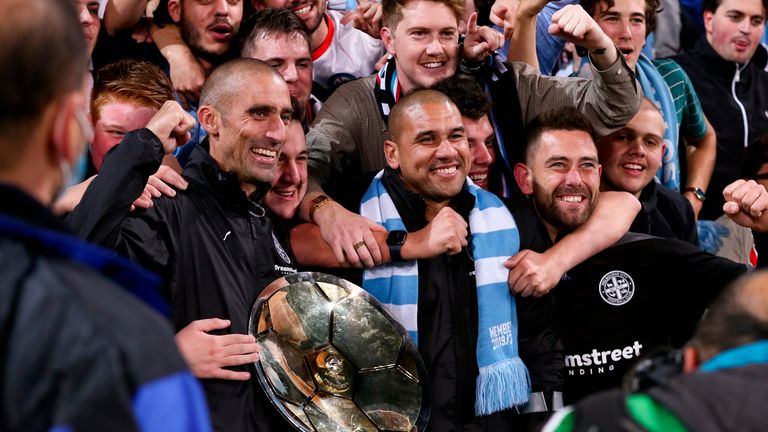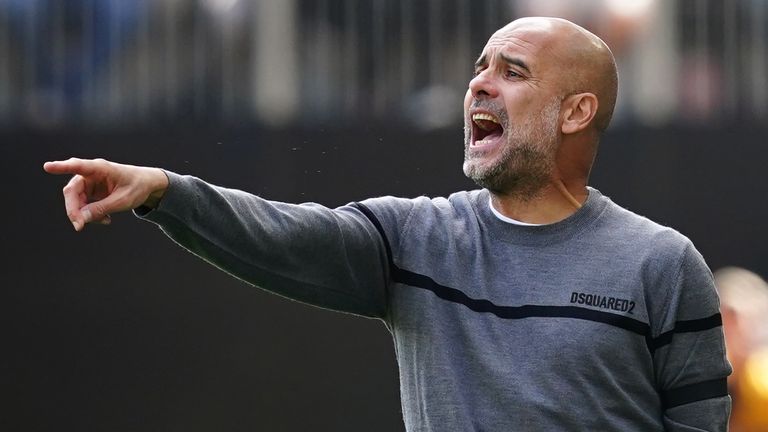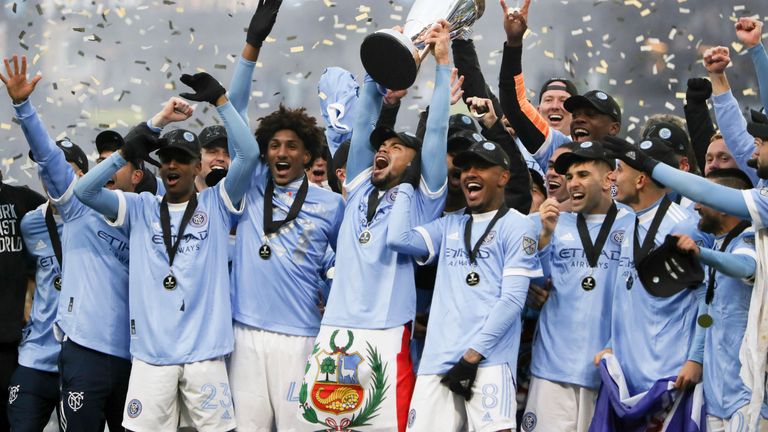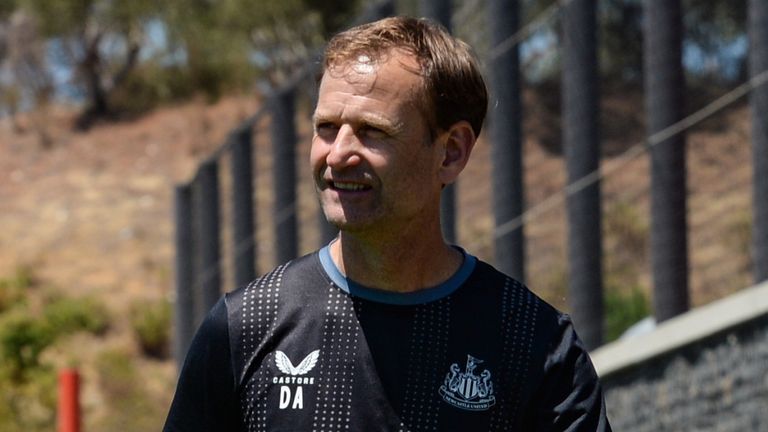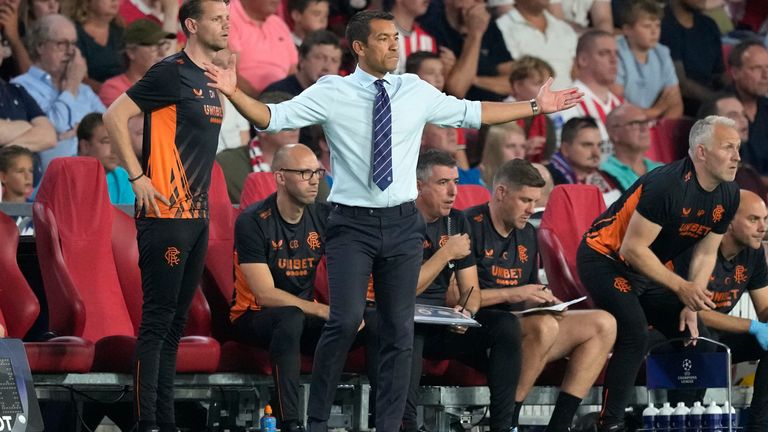Ceri Bowley interview: City Football Group's former head of coaching support on the need to find coaches who fit the philosophy - and back them
Ceri Bowley, former head of coaching support at City Football Group, explains how the philosophy made famous by Pep Guardiola became a methodology and the work that should go into finding the right coach – before and after they are appointed.
Thursday 9 February 2023 13:36, UK
Ceri Bowley still follows his former clubs but given that his role at City Football Group saw him oversee the progress of 11 of them, that can be tricky. “If I have a two-hour window on a Sunday evening, I will still watch the games,” he tells Sky Sports.
"But back then I had the streams from around the world and I would watch every single game of every single club with which I was working. I would be up at 8am for a game in Melbourne and be up until 3am the next morning watching a game in New York."
Whether it was Patrick Kisnorbo in Melbourne or Des Buckingham in Mumbai, conversations would follow. "I would have calls with the coaches immediately afterwards. Later in the week, we would do a debrief before the next game. I would do the same with New York."
Bowley was the head of coaching support for CFG, Manchester City's parent company which owns 11 football clubs. He responsible for recruiting the coaches for the most successful multi-club structure in world football. His job was to bring alignment, a defined methodology to the philosophy made famous by Pep Guardiola.
He is speaking to Sky Sports over coffee in Hay-on-Wye, not far from his home in Merthyr. Bowley, 35, has spent more time there lately since leaving his role as Giovanni van Bronckhorst's assistant at Rangers. It has been a time to reflect on experiences and on ideas.
There is one that he is asked often. What is the City way?
"That is a question I had to ask myself. When I first arrived, all I kept hearing was, 'They are a City person.' Or, 'I am not sure they are a City person.' So, what was that? What I found is that the philosophy was in place but the methodology behind it needed developing.
"What did we believe in? Build from the back, play through the thirds. The philosophy is non-negotiable. Every club is expected to play a version of what Pep plays, though I should add that the philosophy was set prior to Pep's arrival at Manchester City.
"Of course, he has taken it to new heights. The idea is that if you take the shirts off you could pick a City Football Group team.
"But the style of play is one thing, the process for how we do it is another. Where does the sports science fit in? How does the data analysis come in? All of a sudden, you get more of a holistic picture. It is a mental model, a way of looking at the game.
"It is not the head coach's job to do that. Of course, he has to be aligned but it is not his job to make sure that the sports science team is geared up for how the team is going to play. That should come from the club. At City, that was our methodology."
It helped that Guardiola and director of football Txiki Begiristain spoke with one voice. "If you asked Txiki certain questions and then went in another room with Pep and asked the same questions, you would not know from the answers which one you were talking to."
But Bowley's role was to ensure everyone else was on the same page. "That is the thing I would hope makes me unique. It is interesting when you look at sporting directors, how few actually focus on developing coaches. At City, that development happened centrally."
Finding the right people was a major operation.
"Alongside the coach recruitment process was a surveillance programme that was ongoing. I would interview maybe three coaches a week, often more. Maybe I would go to a game with them or just speak about a game. You start to build up some insights.
"There was a lot behind it. Ten people was a minimum for us in terms of people who knew them and worked with them. It might be an agent of a player. It might be a player who did not play an awful lot. If you know the worst thing you are onto a winner.
"We did a lot of analysis on how you put a team together too, establishing the dynamic of a team, what the core characteristics need to be. We knew that we needed different personality types because you cannot build a coaching team with the same personality.
"We ended up with data on thousands of coaches but in terms of in-depth data on game style, personality types, we had that on 500 to 600 coaches. We needed to know who the top five candidates are for every single job if and when that job comes up."
Of course, part of Bowley's job was to ensure that those top jobs did not come up as often as they do elsewhere. By ensuring that the recruitment was right in the first place, CFG have been able to enjoy an unusual level of continuity in their coaching roles.
"I am really proud that no manager appointed while I was there was sacked. In 2021, Man City, Melbourne, New York and Mumbai all won their respective league titles in one calendar year. That is not because of me but I know I helped to hire those coaching teams.
"Clubs recruit managers who do not play the style that they want to play. It is interesting when you see them get sacked. At City, out attitude to that came from [managing director] Brian Marwood. If we had to sack someone then we had failed.
"Girona were in the bottom three after eight or nine games in the season, they got promoted but you could see positive signs. If you can see you are getting so many penalty-box entries, getting chances but not taking them, at some point that is going to turn.
"We were able to see the situation with confidence based on key markers that were established from past performances of clubs across the group. These helped us to determine how far away we were and what needed developing.
"We were looking at methodology, the journey you have to go on to win. We had won in Melbourne and Mumbai so we could see that we had reduced the age of the squad by four or five years and it was the first year that Girona fully adopted our game-model.
"If you want to change the style, you have to appreciate what you are going to have to go through to succeed. Yes, Girona were in the bottom three for a long time in that promotion season but we stuck with them because we believed in what they were doing."
Bowley's own journey has been circuitous. He left Bristol Rovers at 17 and stopped playing semi-professionally at 22. "Dad would still be upset at that now," he says. He formulated a plan to be a sporting director even before the role was established in the United Kingdom.
He worked part-time for the FA while doing a PhD in sports psychology and coaching science that he completed by the age of 28. He was head of youth at a club in Merthyr, helped build the academy at Barry Town, coded games for Cardiff City and spent time at Swansea.
He worked in sports development. "My job was to increase physical activity in schools. We introduced dodgeball and ultimate frisbee and that kind of stuff." He even worked in netball with the Wales national team. "It is up to you to learn the culture. That stood me in good stead," he explains.
"Do not just take a job because of the gravitas, take a job where you are going to learn. You need to do your time. I knew I was not going to have 500 Premier League games under my belt. I wanted something to bring to the table. I needed to be different in some way.
"You cannot be an expert on everything but what does sports science look like? What does psychology look like? I want to understand everything. You have experts but in a leadership role if you do not know what good looks like then you cannot give clarity.
"There are lots of routes to sporting director and a lot of them are good at what they do but running a football club is about so much more than your niche. Dan Ashworth and Stuart Webber are two examples I look at in terms of how they do it. They join the dots."
It is that sense of perspective that he hopes to bring to his next role. "The long-term goal was always sporting director but I am open to different experiences. It might be academy director or head of recruitment. For me, the next step is working with good people, being challenged and continuing to learn. I do not want to rush the process.
"I don't see myself being a manager in the future."
Three months as assistant to Van Bronckhorst at Rangers may have solidified that view. Having been responsible for supporting the coaches at CFG and trying to look beyond the results, Bowley soon found himself at the mercy of them. It was a learning experience.
What is certain is that his next club will be getting a diligent and committed individual with an unusual breadth of knowledge within the game. One moulded by the ideas of City and informed by the challenges at Rangers. His views on football remain steadfast.
"You have to appreciate that will limit where you can work," he says. "I know that I could adapt but I would also want to be true to myself. If I did not fully believe in their way of playing, I would find that very difficult. You have to stand for something."


